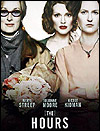 The
Hours: Never Cry Woolf
The
Hours: Never Cry Woolf
 The
Hours: Never Cry Woolf
The
Hours: Never Cry Woolf
The Hours is one of those movies that is almost too good for its own
good. It's custom-built for award season. It features three terrific female
lead performances; one great male supporting performance; assured direction;
a tight screenplay; a distinct musical score; and memorable costumes, cinematography,
and art direction. Is it an Academy Award favorite? Are ya kidding?! And then
some!
Based on the novel by Michael Cunningham, The Hours is a solid,
poignant, adult motion picture. Dismissing it as a "chick flick" just
because its three leads are female would be a mistake. Similarly, dismissing
it as a gimmick film just because it takes places on three different days in
three totally different time periods would also be a mistake. The movie is about
characters and behavior with common themes and ideas running throughout. It
has more connective tissue than most linear films I sit through each year.
Nicole Kidman stars as author Virginia Woolf, who we come to know in
1921 as she struggles through the first day of her writing the classic novel,
"Mrs. Dalloway," in a distant London suburb she has come to view more
as a prison than a retreat. Flash forward to 1951, and the film's second story
follows depressed housewife and mother Laura Brown (Julianne Moore) as
she tries to bake a birthday cake for her milk-toast husband (John C. Reilly),
while obsessively reading the now-classic "Mrs. Dalloway." The third
plotline in The Hours takes place in Manhattan 2001 (essentially present-day,
although pre-9/11), with Meryl Streep as book editor Clarissa Vaughan
on the day she is planning a party for her dying former lover (Ed Harris,
in a showcase of controlled rage and regret) who refers to her repeatedly as
"Mrs. Dalloway."
For those unfamiliar with the book and its author, "Mrs Dalloway"
was Woolf's first great work of literature. Despite an exceptionally high intellect
and a razor-sharp wit, Woolf suffered from mental illness that threatened to
engulf her throughout her writing years. The title character of "Mrs. Dalloway"
is an equally depressed woman who goes about the seemingly mundane tasks of
planning a party all the while contemplating suicide.
In The Hours, director Stephen Daldry, screenwriter David Hare,
and editor Peter Boyle cut masterfully back and forth through the three
stories, hitting upon similar themes of loneliness, longing, despair, and resolution.
Each storyline begins with its central character waking up, and each ends with
that character at bedtime. There is an implied lesbian theme running throughout
the three plots, as Woolf is attracted to the energy and lifeforce of her visiting
sister, Vanessa (Miranda Richardson). Laura Brown is drawn to Kitty,
a vivacious neighbor (Toni Collette) whose health may soon take a turn
for the very worst. And, finally, there is Clarissa who is able to live an openly
gay lifestyle with her live-in partner, Sally (Allison Janney).
I was most amazed by how sharply drawn Daldry and Hare were able to make several
of the film's minor characters. Collette has only one scene, but you do not
forget her after she leaves the screen. Similarly, Jeff Daniels is just brilliant
in his one scene as the former lover of Clarissa's dying friend.
But, of course, it is Kidman, Streep, and Moore whose faces are on the poster.
They certainly deliver. Kidman is the most impressive. She's practically unrecognizable
as Woolf, sporting a prosthetic nose, muted makeup, and downplayed eyebrows.
And her voice is just perfect. Throaty and aristocratic, you'll swear Daldry
had some English schoolmarm dub over Kidman in post-production. But it's her,
all her. Moore and Streep turn in their usual top-notch work, with Moore having
an especially tough role as so many of her scenes are either alone with very
little dialogue or with only the young Jack Rovello as her son, Richie.
At its heart, The Hours is a meditation on depression, suicide, and staying
true to one's own self even when doing so could lead to your doom. Woolf and
Laura Brown want to kill themselves (the film is actually bookened by Woolf's
suicide years after writing "Mrs. Dalloway"), while Clarissa cares
for a man on the verge of leaving this world. Surprisingly, for a film about
such depressing subject matter, the real triumph of The Hours is that
it isn't a downer. There is a lot of bravery on display throughout. It thankfully
doesn't wallow. It has too much story to tell. The characters are people who
seek deeper meaning in things. Some pay the price for staring into the same
abyss that stares back at them. Others squint, turn away, and find little ways
to cope and move on.
Despite these many positives, though, I have to admit that The Hours
is a film that never really grabbed me. It's not one of those flicks that I
have been telling friends and loved ones, "Ohmygod! You gotta see this
movie!" Part of the problem was the film's episodic nature. I wanted each
of the three main storylines to be even more fleshed out than they are now.
I especially got into the Laura Brown plot line, and would loved to have seen
more from Collette and Rovello. But NOT Reilly. This guy needs to stop playing
weakling husbands (like he did in The Perfect Storm, The Good Girl,
Chicago). John, we get the point. You're a homely man, who shouldn't
marry chicks like Jennifer Aniston, Renee Zellweger, and Julianne
Moore. Enough already!
The Hours is rated PG-13 for mature thematic elements, brief profanity,
and some disturbing images.
[Home]